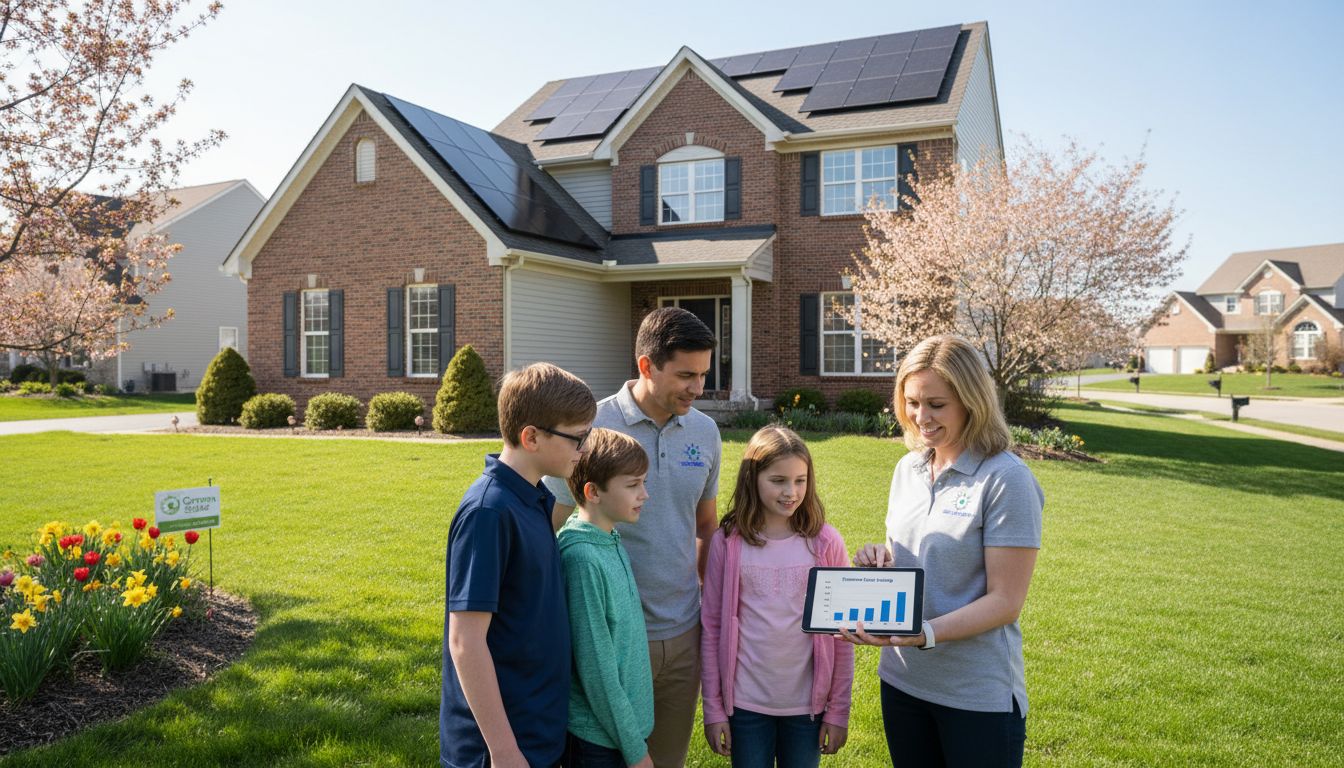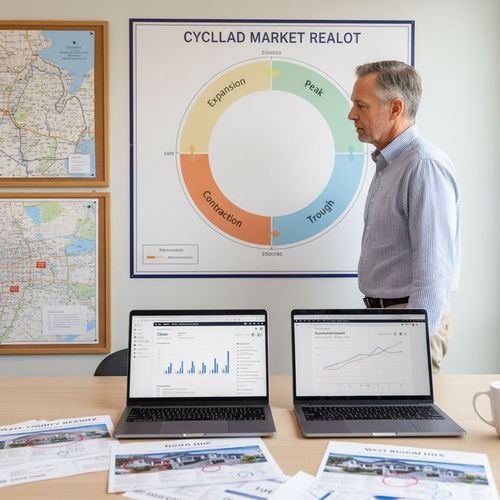Solar Panels in Michigan: Complete Homeowners Guide

Did you know that Michigan has installed over 2,100 megawatts of solar energy and now covers nearly 2 percent of the state’s electricity needs? More families are turning to solar panels as the cost of electricity rises and environmental concerns grow. With new technologies and a range of incentives available, homeowners across Michigan are finding real opportunities to cut bills and shrink their carbon footprint.
Table of Contents
- Solar Panels In Michigan Explained
- Types Of Solar Panels And Systems
- Installation Process And Local Regulations
- Incentives, Rebates, And Tax Benefits
- Costs, Maintenance, And Resale Value
Key Takeaways
| Point | Details |
|---|---|
| Growing Solar Capacity | Michigan has installed 2,100 MW of solar capacity, contributing around 1.87% to the state’s total electricity generation, signaling rapid renewable energy growth. |
| Diverse Solar Options | Homeowners can choose from roof-mounted, ground-mounted, or community solar systems, depending on property layout and energy needs. |
| Financial Incentives | Michigan residents can access federal tax credits, state programs, and local utility rebates to significantly reduce the upfront cost of solar installation. |
| Long-Term Benefits | Solar panels can increase home values by 4–5% and typically pay for themselves in about 12.5 years, offering clean energy and low maintenance for decades. |
Solar Panels in Michigan Explained
Michigan’s solar energy landscape is rapidly evolving, with the state making significant strides in renewable energy adoption. Solar photovoltaic systems are becoming increasingly popular among homeowners looking to reduce electricity costs and decrease their carbon footprint. According to research from the Solar Energy Industries Association, Michigan has currently installed 2,100 MW of solar capacity, representing approximately 1.87% of the state’s total electricity generation.
The solar potential in Michigan is unique, with systems designed to handle varying seasonal conditions and moderate sunlight levels. The University of Michigan’s Graham Sustainability Institute highlights that solar installations can be effectively implemented across different settings - from rural properties to suburban neighborhoods. Homeowners have multiple options, including roof-mounted panels, ground-mounted systems, and community solar projects.
Key considerations for Michigan solar panel installations include:
- Optimal panel positioning to maximize winter and summer sunlight exposure
- Understanding local zoning regulations for solar energy systems
- Evaluating roof structural integrity and sun exposure
- Calculating potential energy savings and return on investment
While Michigan might not have the abundant sunshine of southwestern states, technological advancements in solar panel efficiency have made renewable energy increasingly viable. Tips for new home owners can help you navigate the initial steps of solar panel implementation, ensuring you make an informed decision about your home energy strategy.
Types of Solar Panels and Systems
Michigan homeowners have several solar panel technologies to choose from, each offering unique advantages for residential energy production. The most common types include monocrystalline, polycrystalline, and thin-film solar panels, which differ in efficiency, appearance, and cost. Monocrystalline panels are typically the most efficient, with sleek black designs that blend well with modern home aesthetics.
Cutting-edge solar technologies are pushing the boundaries of energy efficiency. According to research on solar cell development, perovskite solar cells represent an exciting emerging technology, offering potential for high efficiency and significantly lower production costs. These innovative cells are structured with perovskite-structured compounds that could revolutionize solar energy capture in the future.
Another advanced solar technology gaining traction is heterojunction solar cells, which combine different materials to maximize energy conversion. Research indicates that commercial heterojunction (SHJ) cells are achieving impressive average efficiencies of 25.0% in 2023, making them an attractive option for homeowners seeking maximum energy production.
Here’s a comparison of the main solar panel technologies available to Michigan homeowners:
| Technology | Efficiency | Appearance | Cost | Pros |
|---|---|---|---|---|
| Monocrystalline | High (18–22%) | Black, sleek | Highest | Best performance Long lifespan |
| Polycrystalline | Moderate (15–17%) | Blue, speckled | Moderate | Affordable Reliable |
| Thin-Film | Lower (10–13%) | Thin, flexible | Lowest | Lightweight Versatile installation |
| Perovskite (Emerging) | Potentially High | Various | Low (future) | High efficiency potential Lower manufacturing cost |
| Heterojunction (SHJ) | Very High (up to 25%) | Black, modern | High | Top efficiency Advanced hybrid technology |
Key types of solar panel systems for Michigan homes include:

- Roof-mounted systems: Most common residential installation
- Ground-mounted systems: Ideal for properties with ample land
- Community solar projects: Shared solar installations for neighborhoods
- Portable solar systems: Flexible options for supplemental energy
Tips for new home owners can provide additional guidance on selecting the most appropriate solar panel system for your specific home and energy needs.
Installation Process and Local Regulations
Navigating solar panel installation in Michigan requires understanding both technical requirements and local zoning regulations. According to the University of Michigan’s Graham Sustainability Institute, each municipality may have unique planning and zoning guidelines for solar energy systems that homeowners must carefully review before beginning their installation project.
The Michigan Department of Environment, Great Lakes, and Energy provides comprehensive resources to help homeowners understand local solar installation policies. Local regulations typically cover critical aspects such as panel placement, height restrictions, setback requirements, and aesthetic considerations. Some communities might require additional permits or have specific guidelines about solar system visibility from public streets.
A typical solar panel installation process in Michigan involves several key steps:
- Initial site assessment and solar potential evaluation
- Obtaining necessary local permits and approvals
- Structural roof or ground mounting preparation
- Electrical system integration and grid connection
- Final inspection and system activation
Homeowners should also be aware of potential restrictions in historic districts or neighborhoods with strict homeowners association guidelines. Tips for new home owners can provide additional guidance on navigating these local regulatory landscapes and ensuring a smooth solar panel installation process.
Incentives, Rebates, and Tax Benefits
Michigan offers a range of financial incentives to encourage solar panel adoption, making renewable energy more accessible and affordable for homeowners. According to the Michigan Department of Environment, Great Lakes, and Energy, these programs are designed to support residents in transitioning to clean energy solutions while reducing overall installation costs.
The MI Solar for All program stands out as a significant initiative, particularly targeting low-income and disadvantaged communities. This program provides financial assistance for rooftop solar installations, community solar projects, and energy storage systems. Homeowners can potentially benefit from multiple layers of financial support, including federal tax credits, state-level incentives, and local utility rebates.
Key financial incentives for Michigan solar panel installations include:
- Federal Solar Investment Tax Credit (ITC): Currently offers 30% tax credit for solar installations
- Michigan Residential Solar Tax Exemption: Prevents increased property taxes from solar system installations
- Net Metering Programs: Allows homeowners to sell excess electricity back to the grid
- Local Utility Rebates: Varies by specific utility provider
Tips for new home owners can help you navigate these complex incentive programs and maximize your potential savings when investing in solar energy for your Michigan home.
Costs, Maintenance, and Resale Value
Installing solar panels in Michigan represents a significant financial investment with long-term benefits. According to EnergySage, the average Michigan homeowner typically requires an 11 kW solar panel system, which costs approximately $34,112 before applying available incentives. The payback period for this investment is estimated at 12.56 years, after which homeowners can enjoy essentially free electricity.
Maintenance for solar panel systems is relatively straightforward, with most high-quality installations requiring minimal annual upkeep. Homeowners should plan for occasional professional cleaning and periodic electrical system checks to ensure optimal performance. Most solar panels come with 25-year warranties, providing significant peace of mind and protection for your renewable energy investment.
Key financial and maintenance considerations include:
- Initial Installation Costs: Varies based on system size and complexity
- Annual Maintenance: Typically low, ranging from $150-$300 per year
- Performance Degradation: Approximately 0.5-0.8% efficiency loss annually
- Warranty Coverage: Most systems offer 25-year manufacturer warranties
Resale value is another critical factor for Michigan homeowners. Solar panel installations can potentially increase home market value by 4-5%, making them an attractive feature for environmentally conscious buyers. Tips for new home owners can provide additional insights into maximizing the financial benefits of solar energy investments.
Take Control of Your Michigan Home’s Energy Future with Expert Real Estate Guidance
Switching to solar panels offers Michigan homeowners the chance to cut costs and boost home value but navigating the right solar technologies, local regulations, and financial incentives can feel overwhelming. Understanding monocrystalline, heterojunction, or ground-mounted systems, and timing your investment while factoring in payback periods and resale impact requires trusted support.

Partner with Tom Gilliam at Homes2MoveYou.com, where expert real estate knowledge meets a passion for helping homeowners achieve their energy and property goals in Farmington Hills and throughout Oakland County. Whether you are buying a home primed for solar upgrades or selling a property with solar benefits, Tom’s experience ensures you maximize value and avoid pitfalls. Act now to secure your future with renewable energy and savvy real estate moves by visiting Homes2MoveYou.com and exploring Tips for new home owners. Your efficient, sustainable home journey starts today.
Frequently Asked Questions
What are the different types of solar panels available for homeowners?
Michigan homeowners can choose from several solar panel technologies, including monocrystalline, polycrystalline, thin-film, perovskite (emerging), and heterojunction (SHJ) solar panels. Monocrystalline panels are known for their high efficiency and modern appearance, while polycrystalline panels are more affordable. Thin-film panels are lightweight and versatile, whereas perovskite and SHJ technologies are emerging with potential for high efficiency.
How does the installation process for solar panels work?
The typical solar panel installation process involves several key steps: initial site assessment, obtaining local permits, preparing the mounting structure, integrating the electrical system, and conducting a final inspection to activate the system. Homeowners must be aware of local zoning regulations and possible restrictions in historic districts.
What financial incentives are available for solar panel installations?
Homeowners can take advantage of various financial incentives, including the federal Solar Investment Tax Credit for a 30% tax credit on installations, Michigan’s Residential Solar Tax Exemption to prevent property tax increases, net metering programs to sell excess electricity back to the grid, and local utility rebates, which may vary by provider.
What are the maintenance requirements for solar panels in Michigan?
Maintenance for solar panels is usually minimal, consisting mostly of occasional professional cleaning and periodic electrical system checks. Most high-quality solar panels come with warranties of 25 years, and homeowners can expect a slight performance degradation of about 0.5-0.8% in efficiency per year.




